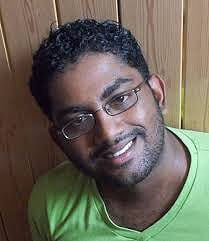
“The Performance” is therefore an annual feature on the local stage that has become a tradition, presented by a different set of students each year. Each time it demonstrates a different programme of theatre – mostly new dramatic performance pieces or new plays. Always, it contains demonstration of new theatre – departures from the ordinary styles and forms of drama, that can be termed the theatre of the 21st century.
Also, of great importance, it is original work produced by the Drama School, representing the work of its students in various areas and disciplines including playwriting, design and production. Certainly, “Mixed Emotions” will show off four short plays written by students of the NSTAD as a part of their studies at the school over the past 5 years.

“The Performance 10 – Mixed Emotions” is produced by Akeisha Gaul and Allia George. It consists of four short plays – Chaos by Subraj Singh, directed by Pamela Atwell; In Cold Blood by Nicholas Singh, directed by O’Neilka Bacchus and Allia George; Contradictions by Nicola Moonsammy, directed by Akeisha Gaul and Donelle Phillips; and Changes Everywhere by students of the NSTAD Workshop on the Teaching of Drama 2018, directed by Deandra Daniels.
The cast for all these plays are from present and past students of the NSTAD. These are current students in the 2018 class, Keron Moriah, Donella Woolford, Shonella Harte and Tinacia Maison in addition to Atwell, Bacchus, George, Gaul, Phillips and Daniels who also act in these plays. They are joined by Creative Writing student Akbar Singh, past student of NSTAD Christophe Greaves, and Kevin Kellman recruited from the Georgetown acting fraternity.
In this production, the students are supported and advised by lecturers of the drama school. Ayanna Waddell, Esther Hamer and Subraj Singh, who are all members of the National Drama Company – professional arm of the school, in stage management, design and acting; Ron Robinson in directing; Godfrey Naughton in production, while Seeta Shah Roath advised and assisted with costuming.
Chaos is one of the pieces in the NSTAD and the NDC collection. It was written by Singh while he was a student of NSTAD in the performance class. In the module of this course known as “the emotions”, students had to create dramatic works whose characters and dramatic situations were driven by strong emotions and defined relationships between characters.
It is set in a psychiatric institution supervised by a doctor with psychological insecurities of her own. She treats her patients with draconian domination and an old-fashioned attitude towards mental illness, which is purgatorial and punitive. The play depends on irony with a particular ironic tail-end. It is driven by emotions of lust, fear, paranoia, schizophrenia and a range of Freudian behaviours.
Like most of the plays in this group, it veers off the beaten track on the realistic stage and delves into modernism. It is a modernist, psychological drama with touches of the absurd. It recalls the fragmented disorders of the human mind as in the drama of French absurdist playwright Eugene Ionesco. It is fact moving and frenetic with a tragic sense of audience sympathy at the end.
In Cold Blood also comes from the NSTAD collection, having been written by Nicholas Singh as part of a class assignment. He produced it as a student in the same performance course under “the emotions” module. It is set in a police station in which a team of detectives interrogate a suspect while investigating a murder.
The police are pretty sure that their suspect killed his wife but are just falling short of the clinching evidence to nail him. The play very cleverly provides the audience with the very convincing evidence that the detectives cannot pin down. This is the presence of the ghost of the murdered wife who enters the police station and virtually participates in the grilling of her murderer. Unfortunately, while her husband can hear her and is plagued by her presence, the police can neither see nor hear her, and the play progresses under sustained agony.
The play is also laced with irony and is itself post-modernist with a touch of the absurd. The dialogue is both spiced up and confounded by the intervention of the ghost and is most telling in the dialogue and outbursts of the husband who is a strong absurdist character. There are also elements of feminism and tangential comments on domestic violence. But it is also a definite Freudian play driven by schizophrenia, aggression, misogyny, deceit, contempt and surprise. It is very intense, if not violent, fast moving and gripping.
Contradictions, too, came out of that class and has been repeatedly performed as a part of the repertoire of the NDC. It was written by Moonsammy while she was a student in the performance class of 2014 as part of the same “emotions” assignment. It has since been in considerable demand.
Of quite a different genre from those mentioned above, Contradictions is a comedy, and a popular short play. It enters a domestic situation that is hilarious for its ridiculousness and farcical proportions, but tragic because it addresses domestic violence and the pathetic mental state of the victim. It goes into the home of an abusive, parasitical and aggressive husband in a triangular affair with an ironic twist of retribution.
There is violence, but there is considerable laughter from the ridiculous plot situation and the irony. The emotions explored include lust, aggression, contempt, fear, greed, and submission.
Changes Everywhere was created by members of the class in the 2018 NSTAD summer course in the Teaching of Drama. This programme was designed to fortify teachers with the content in the subject of drama to equip persons who are already trained teachers with skills in theatre so that they would be able to teach drama in secondary schools and in the CXC programmes.
This play is in the realm of Indian drama with elements of the East Indian culture in Guyana represented in music, dance and ritual. This performance is enriched by costuming as advised and provided by Dr Shah Roath. It surrounds the tragic outcomes of arranged marriages with domineering fathers and reluctant brides.
This programme will also see the appearance of leading performance and spoken word poets Mark Luke Edwards and LeTisha Da Silva, both NSTAD graduates and NDC members.
But the production in chief is the outcome of the classes in acting, production, stage management, make-up, design of costume, set and props, directing, dance and music. The overall production stage managers are Donella Woolford and Donelle Phillips.






